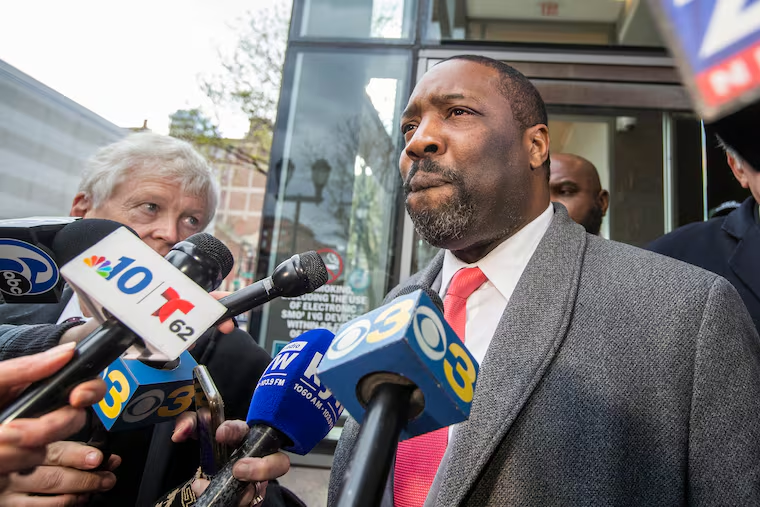Inside the Kenyatta Johnson jury room: Juror details deadlocked deliberations in bribery case
It wasn't a case of a lone holdout hanging up discussions, or a single piece of evidence dividing the panel, the juror said. And, he said, the deadlock wasn’t something any juror took lightly.

From the moment the 12 jurors in the federal bribery trial of Philadelphia City Councilmember Kenyatta Johnson entered the deliberation room last week, the group was split.
They scoured mountains of emails, invoices, and trial exhibits. They debated every aspect of the case, covering the walls and tables with Post-it notes, and even working through lunch. But after 25 hours of discussion over four days, the divisions that had marked their deliberations from the start persisted, according to one member of the panel.
“We took several votes during our deliberations and the numbers did change, but very slightly,” he said. But “at no point did we ever come to a unanimous decision on any charge for any defendant.”
» READ MORE: A judge has declared a mistrial in Philly City Councilmember Kenyatta Johnson’s case. What happens now?
That juror, who spoke to The Inquirer this week on the condition of anonymity to speak freely about the panel’s closed-door discussions, offered the first inside glimpse of the process that ended Tuesday as U.S. District Judge Gerald A. McHugh declared a hung jury and a mistrial in the closely watched corruption trial of Johnson and his wife, Dawn Chavous. Other members on the panel of eight men and four women have declined to comment on what led to the inconclusive ending.
The juror who agreed to be interviewed would not reveal the exact vote split in the jury room, saying he did not want to influence any potential retrial.
But he said the outcome wasn’t an instance of a lone holdout hanging up discussions, or a single piece of evidence dividing the group. The deadlock, he said, wasn’t something any member of the panel took lightly.
“We truly gave it our all,” he said. “Our final outcome of being a hung jury isn’t the sexy headline everybody was hoping for, but it is just another option during a court case. I’m proud of us because nobody sold out their honest verdict on any of the charges just for the sake of reaching a verdict. We gave it an honest, thorough, and good-faith effort.”
» READ MORE: Kenyatta Johnson trial: Day-by-day updates for federal bribery case
Prosecutors have vowed to retry the case, persisting in their accusation that Johnson, a three-term Democrat, accepted nearly $67,000 in bribes — disguised through a consulting contract with his wife — from two nonprofit executives seeking his help with the group’s real estate holdings in his district.
Johnson and Chavous maintain their innocence and have vowed to fight the case a second time if necessary.
» READ MORE: Spotlight shines on Royal Theater at Kenyatta Johnson’s bribery trial
According to the juror, many members of the panel had been wholly convinced by either the prosecution or the defense.
Unlike the federal bribery trial last year of Johnson’s former Council colleague, Bobby Henon — which featured scores of wiretapped conversations and ended in a conviction against Henon and labor leader John Dougherty — the government’s case against Johnson relied primarily on circumstantial evidence consisting of a series of bank records, emails, contracts, and invoices that they said left little doubt of bribery.
The defense balked at the lack of direct evidence, with Chavous’ lawyer accusing the government of forcing jurors to “make a massive logical leap” to secure a conviction.
» READ MORE: A bought politician or bribery scheme invented by prosecutors? In Kenyatta Johnson’s trial, a jury will now decide.
Ultimately, that lack of certainty contributed to the jury’s inability to reach a decision, the juror said.
They sent the court more than two dozen notes, asking to review piles of trial exhibits, and alerted McHugh three times that a unanimous verdict appeared out of reach before the mistrial was declared.
» READ MORE: Kenyatta Johnson jurors said they’ve reached an impasse. The judge told them to keep trying.
Like all of the members of the panel — a group that varied in age, race, and background drawn from a nine-county region including Philadelphia and its suburbs — the juror was serving on a jury for the first time. All but one of the panelists lived outside the city, he said.
Despite their disagreements on the evidence, he said, the deliberations remained civil.
“Everyone was open to hearing others speak and nobody held back in giving their view,” he said. “We were a pretty patient group and gave everyone a chance to speak up. If someone was being quiet, we would ask them their view on the subject.”
Johnson returned to his Council work Thursday with his future unresolved. But with the potential for a second trial — and a potential prison sentence, should the councilmember be convicted — the juror said the process of Johnson’s first trial affirmed his faith in the justice system.
“I’m happy to know,” he said, “that the judicial system has such a thorough and serious process with a jury of one’s peers.”